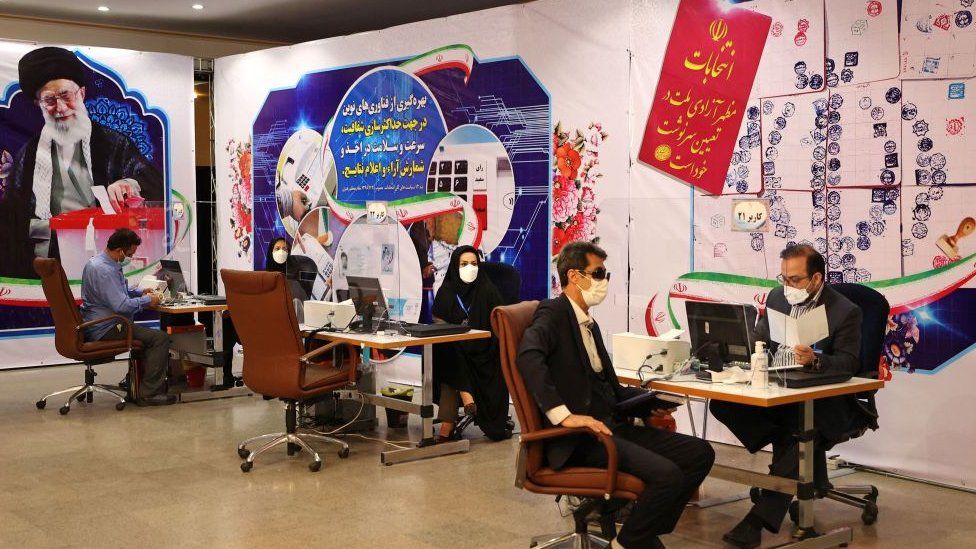Iran's presidential election: Who the candidates are
- Published

Seven candidates have been allowed to stand in Iran's presidential election this month. Hundreds registered but were disqualified by the election watchdog, the Guardian Council. Of those who were approved, five are hardliners.
The two other candidates are a "moderate" - a term applied to those who are less conservative when it comes to issues like relations with the West - and a "reformist", or those who are more liberal in their views about social freedom as well as international relations.
The establishment favourite: Ebrahim Raisi
Many feel the path has been cleared for one candidate to win: Ebrahim Raisi, Iran's head of judiciary and a hardliner, who is regarded as the frontrunner to succeed not just President Hassan Rouhani but, possibly, Supreme Leader Ayatollah Ali Khamenei.
None of the other six candidates enjoy his prestige and influence.
He launched his election campaign with promises to counter the "despair and hopelessness" caused by economic hardship the country is suffering.
Mr Raisi enjoys broad support in the conservative camp and he is expected to have a smooth path to the top after other prominent potential candidates were disqualified
He joined the judiciary after the 1979 revolution and has served as a prosecutor for most of his career, which has not been without controversy.
He was part of a special commission involved in the 1988 mass executions of political prisoners and dissidents while serving as deputy prosecutor of Tehran's Islamic Revolution Court.
He has also served as the custodian of Astan-e Qods Razavi, the holy shrine of the eighth Shia Imam Reza in Mashhad, and the richest endowment foundation in Iran, and is a member of the powerful Assembly of Experts, which is responsible for appointing and removing the Supreme Leader.
The military man: Mohsen Rezai
Sixty-six-year-old veteran Mohsen Rezai was appointed commander of the Islamic Revolutionary Guard Corps (IRGC) in 1981 and led the IRGC forces during the 1980-88 Iran-Iraq war.
He has stood three times as president, and never held public office, having also failed in a bid to be elected to parliament in 2000. He is commonly referred to as a "perennial candidate".
Some have questioned his decisions during the Iran-Iraq war, saying he made choices that led to the deaths of soldiers and prolonged the war - claims he denies.
Mr Rezai has a PhD in economics from Tehran University.
Member of the old guard: Saeed Jalili
Saeed Jalili rose to prominence as Iran's chief nuclear negotiator from 2007-2013, during the presidency of Mahmoud Ahmadinejad, when he was also deputy foreign minister.
As he was appointed directly by Supreme Leader Khamenei to every position he currently holds, Mr Jalili is seen as part of the "old guard" by younger conservatives. His supporters say he is criticised "because of his intellectual independence and lack of corruption".
He wields influence as a member of the Expediency Council, which arbitrates between parliament and the Guardian Council in any dispute.
He has thrown hat into the ring in the past as well, coming third in the 2013 presidential election.
The sole reformist: Mohsen Mehralizadeh
Mohsen Mehralizadeh is the only reformist candidate cleared to stand in this election. However, he is doing so as an independent. His name was not included in the list of the Reforms Front, a coalition of 27 pro-reform political parties and groups, whose nine candidates were all disqualified by the Guardian Council.
It is unclear why Mr Mehralizadeh was favoured above other reformists in this election. His application for the 2005 presidential election was rejected then famously reinstated after Ayatollah Khamenei's intervention. But then he was also banned from standing in the the 2016 parliamentary election.
BBC Monitoring's Kian Sharifi explains why Iranians have been queueing for chicken
The reformists are not particularly popular at the moment. Many Iranians who voted for the current government have become disenchanted and blame it for the country's economic problems, which were exacerbated by the re-imposition of US sanctions after Washington withdrew from the 2015 nuclear deal.
The non-partisan technocrat: Abdolnasser Hemmati
Abdolnasser Hemmati is the only other non-conservative allowed to stand apart from Mr Mehralizadeh. He is a moderate technocrat who has served as the central bank governor since 2018.
His appointments to prominent positions during the terms of President Ahmadinejad and President Rouhani are seen as evidence of his ability to work with the opposing wings of Iran's political factions.
He has faced the sharp devaluation of Iran's currency, US sanctions on Iran's banking sector, including sanctioning of the central bank itself, and domestic challenges with forex speculation, an unstable stock exchange, and Iran's lucrative cryptocurrency market.
Mr Hemmati has a PhD in economics from the University of Tehran and teaches as an associate professor of economics there.
Other candidates
Amirhossein Qazizadeh Hashemi is an ENT consultant surgeon and hardline MP who has represented the Mashhad constituency since 2008. He also served as the first deputy Speaker for a year since May 2020. Aged 50, he is the youngest presidential candidate this year.
Alireza Zakani is another conservative MP known for his strong opposition to the 2015 nuclear deal. He fought in the Iran-Iraq war and, in the early 2000s, served as commander of the nationwide student Basij Resistance Force, a militia responsible for the enforcement of internal security.
He served as an MP for Tehran from 2004 to 2016, and was elected to parliament again in 2020. This is his third presidential election bid. He was disqualified by the Guardian Council in 2013 and 2017.
Related Topics
- Published25 May 2021
- Published23 May 2021
- Published15 May 2021